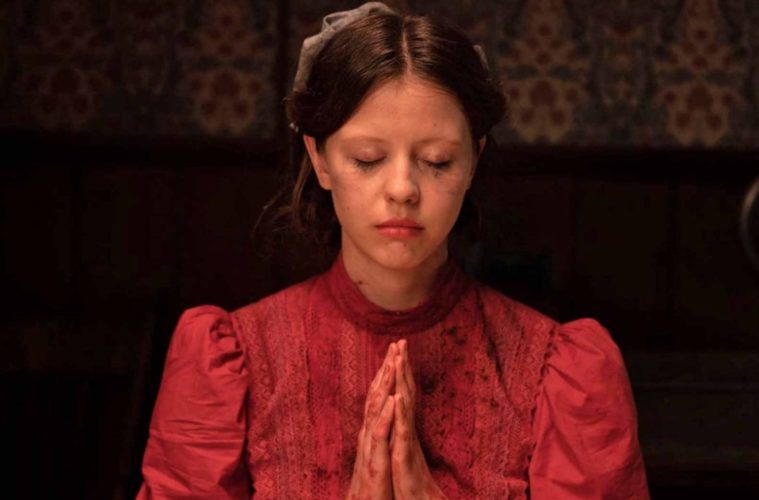 Prequels, like Ti West’s new film Pearl, come bearing an existential mandate—you need audiences that will revere the previous film, and a compelling reason to backtrack in the story, to find out how its rich narrative materials came to be. But West’s X, released in March, was a neo-slasher goof, pitting a ’70s porn crew against a bloodthirsty old Texan hag who liked to use various farm tools to execute the interlopers. There were odd piquant notes of observation about growing old, and for some reason, Mia Goth played both the porn-actress heroine and the homicidal dingbat—suggesting nothing very much. The characters are hacked and squished and shot and alligator-eaten. Honestly, if you’re in this kind of movie and you’re in rural Texas, you should expect as much. The vast majority of films don’t demand prequels, and X was one of them.
Prequels, like Ti West’s new film Pearl, come bearing an existential mandate—you need audiences that will revere the previous film, and a compelling reason to backtrack in the story, to find out how its rich narrative materials came to be. But West’s X, released in March, was a neo-slasher goof, pitting a ’70s porn crew against a bloodthirsty old Texan hag who liked to use various farm tools to execute the interlopers. There were odd piquant notes of observation about growing old, and for some reason, Mia Goth played both the porn-actress heroine and the homicidal dingbat—suggesting nothing very much. The characters are hacked and squished and shot and alligator-eaten. Honestly, if you’re in this kind of movie and you’re in rural Texas, you should expect as much. The vast majority of films don’t demand prequels, and X was one of them.
But West and Goth, co-writing and co-producing, had already decided, with almost Proustian ambition, that this would be an epic, and Pearl was shot back to back with X, with a third film apparently planned. In Pearl, the action flips back to 1918, where the titular farmgirl (Goth) is stuck at her German-immigrant parents’ farmhouse during WWI, with her young husband off at war, her stroke-ridden father (Matthew Sunderland) able to move only a single eye, and her hostile mother (Tandi Wright) running roughshod over her. Early on, about the time Pearl whimsically impales a goose with a pitchfork, we understand the thrust—the girl is simply a psychopath, full stop, given to daydreaming about showbiz stardom and dancing with scarecrows when she isn’t killing things.
This isn’t a whole lot to hang two or three movies on, but West presses forward, slowly piling on Pearl’s frustrating stasis at that farm, alleviated only by her glamorous sister-in-law (Emma Jenkins-Purro) and a flirtatious projectionist in town (David Corenswet). He shows her a stag film, which of course suggests X and its Gothian heroine, but pointlessly. The pace is glacial, until finally, during one of the repetitive family dinner scenes, Wright’s tight-wired Mom lets loose, revealing that she’s always known about Pearl’s homicidal tendencies. The fight that ensues kicks things—and Pearl—into third gear, and the revelation of some kind of family pathology is a relief from the film’s one-note build-up.
Of course, it’s a genre bylaw that every character except Pearl is brutally killed, but the film’s real crucible is Pearl’s late-in-the-game monster monologue, once she’s innocently urged by her sister-in-law to pretend she was talking to her absent husband. All of the character development the film had been ignoring or resisting for an hour and a half comes tumbling out, and for 10 or so solid minutes—during which time we worry about the sister-in-law, off-frame—Pearl becomes a real and volatile quantity, a girl as aware of her own sickness as she is of the social wasteland she’s trapped in, without options or comrades. It’s a shame that the killing quickly resumes after that, and that years later, in X, Pearl the old lady hardly has any other thought in her head.
Ultimately not quite a slasher film, Pearl is more of a cartoonish gloss on the homegrown violence rising like cornstalks out of the hardbitten American heartland. Unsurprisingly, West plays it heavy-handedly, with plenty of trite over-stylization and winking irony, a visual strategy that’s both standard operating procedure these days and a little self-defeating, as if the filmmakers don’t want us to actually get absorbed in their story. But Goth, to her credit, after hitting the clueless-hick note relentlessly, makes a meal out of Pearl’s big scene, and the sense of Middle American craziness, going back generations, becomes palpable for the first time in both films, without a single axe to the head.
X
Editor’s note: The disclaimer below refers to advertising posts and does not apply to this or any other editorial stories. LA Weekly editorial does not and will not sell content.
Advertising disclosure: We may receive compensation for some of the links in our stories. Thank you for supporting LA Weekly and our advertisers.

